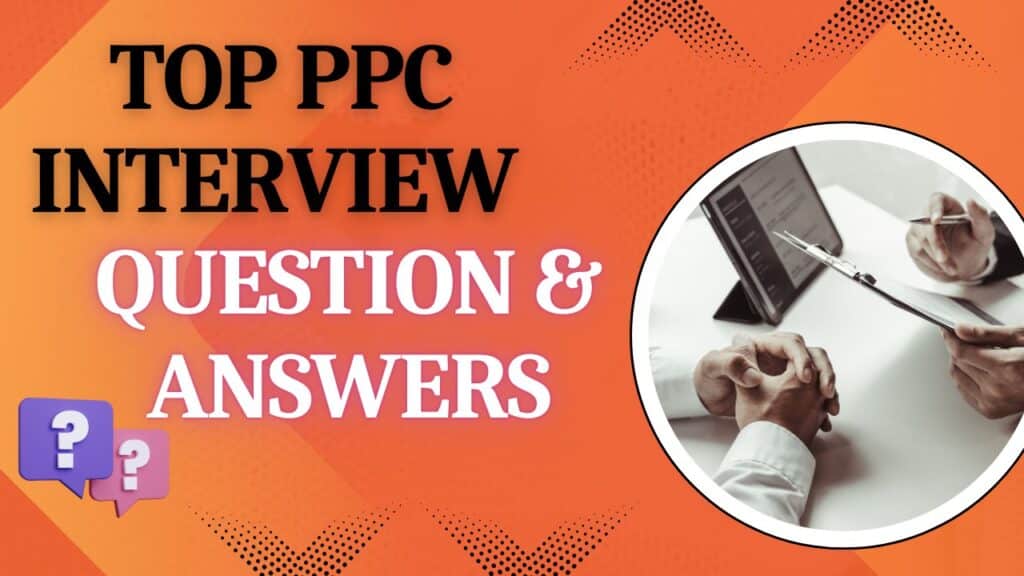PPC, or Pay-per-Click advertising, has revolutionized how businesses market their products and services online. PPC Campaigns can be tailored to meet specific objectives, such as increasing brand awareness, promoting products, or driving conversions. With PPC, businesses can reach potential customers at the right time with the right message and on the right platform.

Here are the Top 10 PPC interview questions that might improve your career opportunities.
1. What is your understanding of PPC and how does it work?
PPC or Pay Per Click is an online advertising model that involves advertisers paying a fee each time one of their ads is clicked. The most common platforms for PPC are Google, Bing, Instagram, Facebook, Twitter, and LinkedIn. This model is designed to drive traffic to websites increasing visibility and potential sales, and this can be done only by choosing the right keywords that can be used by potential customers in searches. By doing the bidding system which determines the cost of PPC Ads, you compete with other advertisers for the same keywords, and then the highest bid wins. Each ad is assigned a quality score based on relevance, expected click-through rate (CTR), and landing page experience.
2. Can you describe the different types of PPC Campaigns?
PPC advertising offers various campaign types that cater to different business goals and advertising strategies. The main types of PPC ads are Search Ads and Display Ads.
- Search Ads – Search ads are the most common ads that appear in SERP when users search for specific keywords. Their main purpose is to capture user intent and drive traffic to a website when they search for related products or services. These ads contain text with no visuals. Common platforms to create search ads on Google Ads, Bing, and Microsoft Advertising.
- Display Ads – Display ads include images, banners, or rich media that appear on websites within a display network. This campaign is used to increase brand awareness and visibility. You can also set your particular target market or focus on targeting people who visited websites similar to your own. Common platforms to create display ads are Google display network or social media platforms like Instagram, Twitter, Facebook, etc. These PPC advertising platforms allow for highly targeted campaigns.
- Shopping Ads – Shopping ads are specifically designed for E-commerce businesses. These ads display product images, prices, and details directly in search results making them highly effective for driving online sales.
3. How do you conduct keyword research for a PPC Campaign?
Conducting keyword research for a PPC campaign is very crucial for ensuring that your ads reach the right audience understand their needs and analyze market trends, starts by brainstorming potential keywords that align with your business offerings and customer search intent tools like Google Keyword Planner, Semrush, Ubersuggest, etc can provide such valuable data on search volume, competition and cost-per-click (CPC) which helps to refine your choices continuously and monitor the performance of your chosen keyword and adjust them as needed, by using analytics tools like Google Ads, and Google Analytics.
4. What is the role of Ad Copy in PPC?
Ad copy plays a vital role in the success of PPC Campaigns by driving user engagement and conversions. It serves as a first point of interaction between potential customers and your brand influencing their decision to click on your ad and ultimately convert. A strong unique selling proposition sets your offering apart from competitors, while an effective call to action (CTA) prompts. Highlighting benefits over features and addresses customer needs and pain points, increasing the livelihood of conversions. Moreover, Ad copy impacts the quality score in platforms like Google Ads, influencing ad placement and cost.
5. How do you measure and analyze PPC campaign performance?
Measuring and analyzing PPC Campaign performance involves tracking key metrics and utilizing analytical tools. There are 3 types of KPIs to track your PPC performance
- Cost Per Click (CPC): This helps you manage budgets and understand how much you are spending on each click.
- Click Through Rate (CTR): Indicates how compelling your ad copy is and its relevance to user queries.
- Conversion Rate: This measures the percentage of clicks that result in desired actions by revealing the effectiveness of landing pages.
- Return on Ads Spent ( ROAS): This evaluates the revenue generated compared to the amount spent on ads helping assess overall profitability.
Regularly A/B testing for different ad variations to identify which elements perform the best. Use insights from your analysis to refine keywords adjust bids, and enhance ad copy ensuring continuous improvement and better results.
6. What is your experience with PPC bidding strategies?
When choosing a PPC bidding strategy you should consider your campaign goals, your budget, and how competitive the keywords are widely used. The approach is manual bidding where advertisers set specific bids for individual keywords allowing for precise control over costs. Next comes automated bidding strategies that utilize algorithms to optimize bids in real-time. Maximize clicks aims to generate as many clicks as possible with a specific budget. Ultimately selecting the right bidding strategy depends on campaign goals and budget constraints.
7. How do you handle PPC ad extensions and why are they important?
Ad Extensions can help your PPC ads stand out in search results, which can lead to more clicks and conversions. There are 4 handling Ad Extensions-
- Site Link Extensions – This directs users to specific pages on your website.
- Call Extensions – Allow users to call your business directly from the ad.
- Local Extensions – Show your business address helping local customers to find you easily.
- Price Extensions – This displays prices of specific products or services.
PPC ad extension offers several advantages like increased CTR, Visibility, UX, Ad Quality Score, Flexibility, and overall conversion rates.
8. Can you explain the concept of quality score in PPC?
Quality score is a metric used by Google ads and other PPC platforms to assess the quality and relevance of keywords and ads. There are some factors that influence quality scores like expected CTR, Ad Relevance, Landing page Experience, Keyword Relevance, Ad Format and Extensions, etc.
A high-quality score can be important for a variety of reasons including cost reduction, improved ad performance, and better user experience.
9. How do you deal with PPC Ad approval issues?
Dealing with PPC ad approval can be challenging but it is essential for ensuring your campaigns run smoothly. You have to understand the advertising policies and guidelines of the platforms you are using check the ad status in the advertising dashboard review and revise ad copy and elements that may have triggered the disapproval. Optimize landing pages with the ad content and provide a good user experience. Utilize ad extensions wisely and even after modifying you still believe your ad is a complaint, then you can file an appeal for a review and keep monitoring your further changes.
10. What are your thoughts on PPC trends and future development?
PPC advertising is an ever-evolving field, influenced by advancements in technology changes in consumer behavior, and shifts in digital marketing strategy. Here are some major trends and future developments in PPC that marketers should put their hands on.
- PPC Automation: PPC Automation has emerged as a powerful to improve campaign-preferred platforms like google ads, which continue to enhance their automated bidding features.
- AI and machine Learning Integration: As we all know AI is expected to have a major impact on the world. Implementing AI in your PPC campaign can help to predict future CTRs, and identify the bids that will get the most traffic. These technologies of data to identify the most effective strategies.
- The Rise of Voice Search: This new feature needs to be adapted by the advertisers to accommodate their conversion queries. Updating the FAQ page on your website or using longtail keywords is another way to set yourself up for voice search success.
These PPC strategies are constantly evolving. Advertisers who stay ahead of these trends and adapt their strategies accordingly will be well-positioned to succeed in the evolving digital landscape.
Most Asked Questions for SEO Interview
Conclusion
In conclusion, PPC interview can be an effective digital marketing strategy for all businesses offering traffic, generating leads, and increasing sales. As the landscape evolves staying updated on emerging trends like automation AI and data privacy will be crucial. However, it is important to remember that PPC is not a one-time activity. To achieve long-term success businesses must continuously monitor and optimize their campaigns adjusting their strategies to achieve the goals. With the right strategy, tools, and tactics, businesses can effectively leverage PPC advertiser to grow



